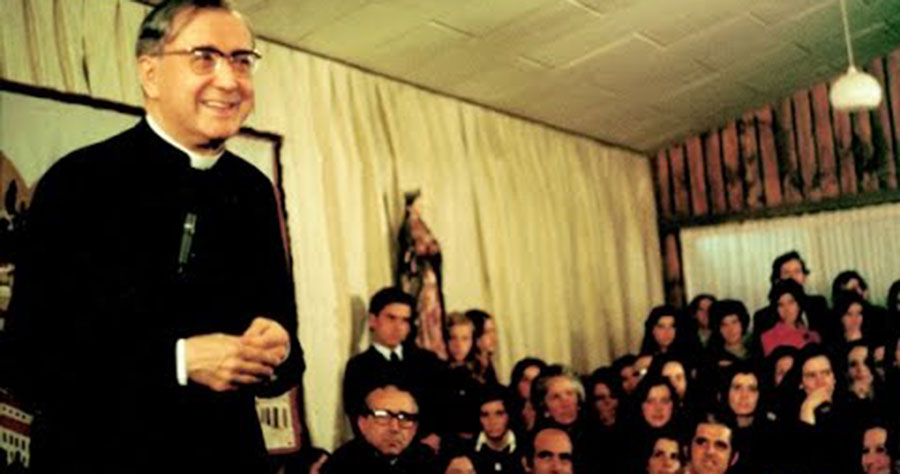I have a confession to make: I once poked fun of a saint.
Back in my graduate school days, as a layman, I worked as a residence counselor in an Irish university setting. Then most Irish universities provided precious few housing opportunities, but some religious organizations operated hostels for students. I found a spot at Nullamore, a beautiful old Guinness family estate in the Dartry section of Dublin.
The hostel was run by a group called Opus Dei, about which I knew nothing at the time. I discovered that Opus Dei is a world-wide conservative Catholic organization, with lay members and clerical priests, that was founded in 1928 by a Spanish priest named Josemaria Escriva. My time there was enjoyable, and I found members filled with good will and convicted faith.
In the years since, Opus Dei was made famous by the fiction (and fantasy) of novelist Dan Brown, author of The DaVinci Code. Opus Dei has been the subject to some criticism because of alleged secrecy and elitism, but does much good seeking the sanctification of both ordinary people and some of society’s movers and shakers. It was Msgr. Escriva’s belief that conversion of heart by the leaders of a society could help stimulate a transformation of our world.
Escriva’s writings included the popular works The Way, The Furrow, and Christ Is Passing By. They are filled with short, pithy invocations, injunctions, and interjections designed to stimulate thought, prayer, and reflection. In my youthful “wisdom,” however, I thought they were trite and too unsophisticated for a college graduate like myself. How could all these economists, government officials, academics, business executives, bankers, physicians and researchers take it so seriously, I
wondered!
My own sensibilities were formed at Saint Anselm under Benedictine influence. The sober, restrained approach to Catholic life — intense, not showy — appealed to me. If a monk wanted to read, he turned to the Fathers of the Church, major theologians, papal or conciliar teachings, the saints, or, always, Sacred Scripture. Two or three-line maxims from Msgr. Escriva? Come on! Yet the saint kept showing up.
Back in the U.S., within weeks of my return, some of my buds from St. A’s decided to get together in Boston. I made the three-hour trek from North Adams east, and arriving at the apartment of one of the guys, I asked if I could change and clean up before we headed out. No problem, said he, use my room and the bathroom next to it. Neatly tucked into the bedroom’s dresser, on the mirror, who should be looking at me? Yup, St. Josemaria!
Time passed and several decades later, I myself was a Benedictine monk at Saint Anselm. Msgr. Escriva had been canonized in 2002 as a real, honest-to-goodness saint and technology arrived in the age of Twitter. Tweets are those 140-character messages, all short and pithy, that politicians, celebrities and even institutions put out sometimes on a daily basis. Our college uses it, the parish secretary uses it, and most of my students use it.
Oh, and who else? Pope Francis, as @Pontifex!
All this left me somewhat conflicted. I certainly realized I had undervalued Escriva, missed the mark on Benedictine spirituality, and underappreciated the impact on evangelizing of very short thoughts expressed in maxims. Michael O’Loughlin, a reporter for The Boston Globe‘s Crux, has just written The Tweetable Pope: A Spiritual Revolution in 140 Characters on that that very topic. It all came together.
St. Josemaria’s book The Way recently appeared in my sacristy. How it got there is anybody’s guess, but apparently St. Josemaria is everywhere. I leafed through it, and I happened upon a maxim that declared how fortunate we are to be working to build up the Kingdom of God rather than some earthly kingdom. And then it struck me!
Thank you, St. Josemaria! The saint’s use of nuggets — tweets? — of the gospel suits today’s short attention spans well. Even more important, how blessed we really are to be called to the Kingdom and to labor for that domain of Christ. Much as we love our own nation, we all know how many problems we face and how much we must overcome.
Christ, the source of all that is good, holy, noble, beautiful, true, free, life-giving and fulfilling in our world, reminds us that our real home is on high.
About the Author: Jerome Joseph Day
Rev. Jerome Joseph Day, O.S.B. is pastor of Saint Raphael the Archangel Parish in Manchester, NH and an assistant professor at Saint Anselm College. This article first appeared on www.realclearreligion.org.

